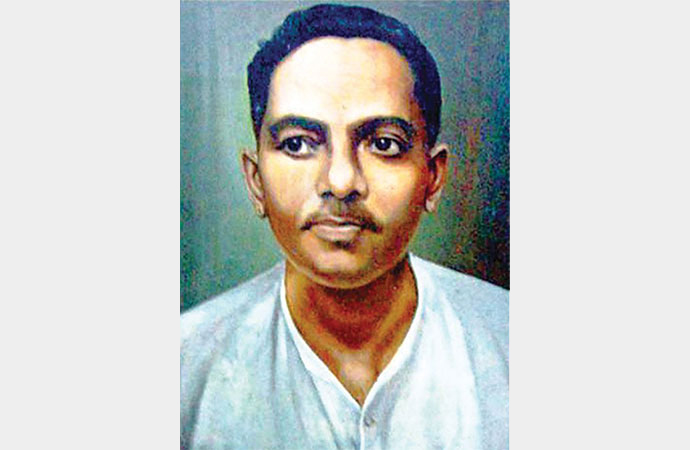Column

Jibanananda Das. Image: Collected
If any poet anywhere was killed by the sentimentality of his fawning fans, it was is Jibanananda Das. Bengalis have condemned him to a sylvan paradise, full of river banks, birds in flight, mellow evenings and dawns and all that is wonderful in the imagined paradise of most, essentially unable to reconcile with the modern urban life.
"Ruposhi Bangla" published after his death epitomizes this but in most Bengali minds, he is still walking the banks of Dhanshiri, where women come to collect polluted water from the river and possibly spread diarrhea.
I am being deliberately prank-nasty because the kind of imagined Bengal which Jibanananda depicts and readers adore never existed and rural life was hardly pleasant. It wasn't full of beautiful rivers and shrieking hawks but poverty, disease and social turmoil.
JD's Bangla is a box full of fecund imagination triggers which we like to think as real. Thus, he has become to the readers, a poet of what never existed except in our fantasies. And we like to think of them as real. That may well be fine really except that the sylvan adoration poems are not part of his supreme craftsmanship and poetic skills.
Let's face it, it's through this that we want to deny the rise of urban civilization as a dispossessory of the rural world, real or imagined. He is a resistance poet one may say of a pre-colonial rural past which may never have existed. That doesn't matter. We are not really reading his poems; we are confirming our own sentimental nostalgia.
But that's not the real him.
His urban poetry roots
JD was educated in Kolkata and took a job in Barisal not by choice but lack of options. He was not a hard-working peasant but a highly educated person who had to go and live close to rice plants and flying ducks. The kind of existential agony is obvious in his poems in general - nobody has ever said he was a happy gent- shows how deep was the internal malady of his soul.
He was an unhappy man and his poetry is full of that, and his imagination was fundamentally urban in nature as many of his poems shows including "One day 8 years back/At bochor age ekdin". It's not the question of imageries but the very urban angst of meaninglessness of life. Peasants are spared this ailment. Like so many alienated souls he was haunted by the sadness hidden deep in his soul for which he had no explanation. It's close to what Camus is supposed to have experienced.
Trapped by history
But history also caught up with him too as he tried to ignore the gathering storm all around Rural Bengal. JD tried to hide in his own historical imagination whether it was in Ashokan or Sravasti ancient urban display culture of the royals or even Ballal Sen's Bengal which had little to do with historical Bengal.
In fact, if anything his "Bengal "was gone, stolen by historical realities. Peasants had become a force which JD ignored or denied and they had overtaken the environs of his literary reality. His move to Kolkata was not by choice but dictated by political events beyond his control.
It was one thing to migrate but another being forced to migrate. Kolkata was not home but his refuge but his poetry was more attuned to the angst inside and he produced some of his finest work there as a sort of "rootless" man. He was not fond of the now hostile urban Kolkata and they were angry images of a cruel city but it was very conducive for his poetry.
The top three?
One may argue on this but take his three top poems, two - "Banalata sen", "At bochore age ekdin" are not sylvan poems but angst driven ones. The third one in my opinion is "Ratri" (The Night. It's an angry poem which demonizes the urban scene and shows his mind was lost in an unfamiliar city and environment. This new found poetic hostility was caused more by his lack of choice rather than the actual reality of urbanity. Why would he be suddenly anti-urban? It's just that history had overtaken him which was inevitable and the resultant bitterness was too.
"The Night" is an angry and helpless poem, so obvious of the inability of the poet to make any changes. He sees horrific images everywhere and seeing everyone and everything as drak is the opposite of the devoted outpouring of "Ruposhi Bangla." Ultimately, he calls the citizens of the night "animals" comparing the city to the jungles of Libya. The theme is fine, the attitude immature but the poetry is great. And just as one may question the devotional nature of his sylvan poems, the revenge poems are OK too.
That's fine. What matters in the end is his poetry.

























Leave a Comment
Recent Posts
Pedaling Through the Mangroves ...
The journey from the bustling streets of Barishal to the serene, emera ...
Why the Interim Government mus ...
Two weeks out from what is expected to be a red letter day in the figh ...
Doesn’t matter who thinks what about Bangladesh deci ..
The Other Lenin
US President Donald Trump said his administration
Govt moves to merge BIDA, BEZA, BEPZA, MIDA